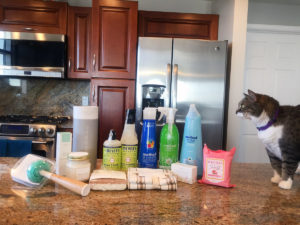 Should you buy a rental property that mandates HOA payments? How do you adjust for cap rate over the years, as the property’s rent increases with inflation? Should you buy an $88,500 house that rents for $1,250 a month? And can you dive into detail about how you work with contractors and property managers?
Should you buy a rental property that mandates HOA payments? How do you adjust for cap rate over the years, as the property’s rent increases with inflation? Should you buy an $88,500 house that rents for $1,250 a month? And can you dive into detail about how you work with contractors and property managers?
I answer these four questions in today’s Ask Paula episode, themed around real estate investing.
Daria asks:
My husband and I live in Charlotte, North Carolina. I’ve been looking at local properties and I notice that a lot of these properties, Class C+ or higher, come with HOAs. For example, I’ve found properties that cost $80,000, rent for $1,000 per month, and have HOA fees of around $150.
How do you think about HOA fees in general, and how do these affect considerations like cap rate? I’d love to hear your thoughts.
Here’s a brief synopsis of my answer:
Avoid the temptation to have a knee-jerk reaction to HOA fees. These can be excellent for helping you control and predict costs, if they handle exterior maintenance at a predictable rate.
Let’s assume, for example, that your HOA covers exterior maintenance such as:
- roof repair and replacement
- siding and garage door repair and re-painting
- gutter cleaning
- lawn mowing
- hedge trimming
- leaf blowing
- pest control
- snow removal
You can eliminate these costs when you’re estimating routine maintenance. You can predict these costs with greater precision, since you know the HOA fee.
These are standard operating costs. As an investor who owns properties without HOAs, I don’t avoid these costs. Instead, I pay for these costs piecemeal, and I have the responsibility of addressing each of these components.
Yes, sometimes that results in net cost savings, because I can compare prices and shop around. But it also results in less predictability and greater lump-sum outlays, like when I have to write an $8,000 check to replace a roof.
If you’re self-managing your properties, then the absence of an HOA creates additional work, because you need to call contractors, gather quotes, make a hiring decision, and follow-up and evaluate that contractor’s work.
If the HOA fee covers utilities expenses like water, sewer and gas (for example, in a condo complex), then you can also predict these costs with greater precision.
There’s no problem with HOA fees conceptually. The issue arises (1) when the cost is significantly in excess of what an investor would reasonably pay for comparable services (in other words, when you’re getting bilked), or (2) when the HOA goes into arrears, which impacts your ability to sell or refinance the property.
On the podcast, I elaborate further on how to handle these two issues.
Sabrina asks:
How does the cap rate on a property change over time, as the rent increases with inflation and other operating costs shift around?
(I’m adding an example to Sabrina’s question):
Let’s say that you buy a property that, today, rents for $1,000 per month. Inflation increases at 3 percent, and you adjust the rent annually to keep pace with inflation. The rent would look like:
- Year One – $1,000
- Year Two – $1,030
- Year Three – $1,062
- Year Four – $1,093
How would this affect the cap rate?
Jasmin asks:
I’m looking at a rental property with the following numbers.
The purchase price is $88,500, with a 20 percent downpayment.
I’d pay $7,000 in closing costs, mostly upfront taxes and insurance. I’d also pay $2,000 in initial repairs and other fees.
My total out-of-pocket expenses to enter this deal would be $26,700.
My gross rent would be $1,250 per month, with estimated 8 percent vacancy. This means my potential gross rent would be $15,000 annually, and my effective gross rent would be $1,150*12 = $13,800 annually.
I estimate $555 monthly in expenses ($6,660 annually), including setting aside one percent of the purchase price for repairs and maintenance and another one percent of the purchase price for capital expenditures.
What do you think of this deal?
Rob asks:
Can you please explain how you work with your contractors and property managers? On your blog, you describe texting with your contractor, but shouldn’t the manager handle that? Any insight into how you handle these relationships would be great.
P.S. – Airbnb makes it easy to put your extra space to work for you. Become a host today, and you can start boosting your income!
Resources Mentioned:
- How to Calculate Cap Rate – Afford Anything article
- Real Estate FAQ HQ
- How I Bought 20 Houses, Debt-Free, While Serving Overseas in the Military, with Rich Carey
Thanks to our sponsors!
Grove Collaborative makes it easy to discover amazing natural home and personal care products. Grove selects only the best non-toxic products, so you can shop with confidence knowing that everything on their site is good for you, your family, and the planet. To try them out, head to grove.co/afford, sign up, and with a purchase of $20 or more you’ll receive a free $30 Mrs. Meyer’s kit + a bonus gift!
Simple Contacts is a super easy way to renew your contact lens prescription – you can reorder your brand of contacts from anywhere in minutes. You take a 5-minute vision test from your phone or computer, the results get reviewed by a licensed doctor, and you receive a renewed 1-year prescription. Get $20 off your order by going to simplecontacts.com/paula!
Busy, but love to read and learn? The Blinkist app transforms the key insights of 2,000+ bestselling nonfiction books into powerful packs that you can read or listen to in just 15 minutes! Over 5 million people use Blinkist everyday to discover the insights they need to become their best selves. You can start a free trial or get 3 months off your yearly plan when you join at blinkist.com/paula.
Policygenius is an easy way to compare life, disability, renter’s, and health insurance online. It takes just 5 minutes to compare quotes! So if you need life insurance, but you’ve been putting it off because it’s too confusing or time-consuming to look into, check out Policygenius.
 Grove Collaborative
Grove Collaborative